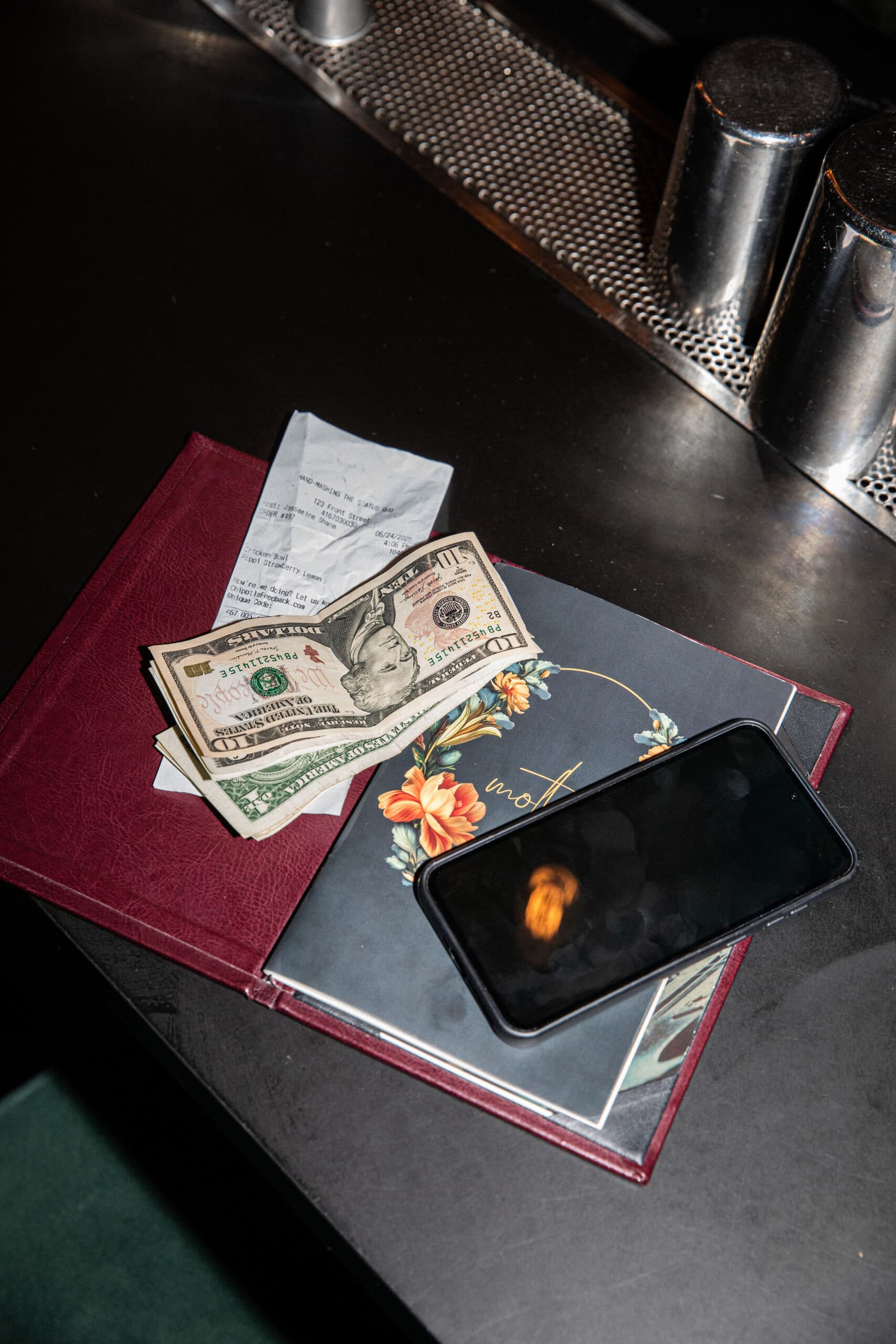Summary
Location: New Jersey, USA
New Jersey follows most federal tip rules but adds stricter protections for employees. This includes bans on credit card fee deductions and stronger enforcement of record-keeping and tip credit rules. Withholding tips and failing to make up wage shortfalls can lead to hefty fines and even criminal charges.
Key provisions:
- Tipped minimum wage is $6.05 per hour with a $9.87 tip credit (2026)
- Credit card processing fees can’t be deducted from tips
- Employers must keep “true and accurate” daily or weekly tip records for at least 6 years
- Violations can result in $500 to $5,000 fines, back wages, and punitive damages
New Jersey generally follows federal tip law standards, but the state does forge its own path in some key areas. It has a higher rate than the national minimum wage and has stricter rules when it comes to tip pooling, deducting credit card fees, doing non-tipped work, and record-keeping. As an employer, you must be mindful of NJ labor laws and stay informed of potential changes to protect your business.
2026 Tipping Playbook
Learn how to manage, distribute, and track tips fairly—while staying compliant and keeping your team’s trust.

What counts as a tip in New Jersey?
A tip is any extra money a customer gives directly to an employee for good service. The customer must choose to leave the tip. It shouldn’t be required nor added automatically by the restaurant.
Cash left on the table or handed directly to the worker is considered a tip. Digital or electronic tips from credit cards, POS systems, ordering apps, gift cards, or certificates are also owned by the employees as long as they’re given voluntarily.
In 2026, it’s more important than ever to track this correctly. Under New Jersey law, all tips are considered taxable wages. That means workers must report all tips to their employer. For employers, you must include tip income in wage reporting, and you’re responsible for withholding taxes on that income. Failing to track tips properly can lead to problems such as underpaid taxes or even wage theft claims.
What’s a service charge?
A service charge, on the other hand, is a mandatory fee added to a customer’s bill, usually in place of a tip. Unlike tips, which customers leave voluntarily, service charges are set by the restaurant and must be paid. It could be an 18% rate added on top of the bills of all large parties or a “hospitality fee” added to every check.
While the tip belongs to the employee, a service charge belongs to the business. It’s not counted as tip income and can’t be used toward the tip credit. If you choose to share a service charge with your team, you must treat it like wages, so you must record and include it in payroll. It must also be taxed like regular pay and counts toward an employee’s gross wages, not their tip income.
Who qualifies as a tipped employee?
A tipped employee is someone who customarily and regularly receives tips as part of their job. To qualify, they must earn more than $30 in tips per month. If they don’t hit that threshold, they no longer qualify as a tipped worker, and you can’t use the tip credit for their wages.
Servers, bartenders, and bussers are common roles that count as tipped employees. Before you apply the tip credit, though, you must give the employee written notice. This should include their base cash wage (at least $6.05 per hour in 2026, the tip credit amount you’ll apply, and a statement that they keep all tips, except for valid tip pool arrangements.
The employee also must actually keep their tips, unless they’re part of a tip pool shared with other tipped workers. The pool can’t include managers, BOH staff, or anyone who doesn’t regularly earn tips.
Knowing the 80/20 rule
In New Jersey, if an employee’s tasks change or they spend too much time on non-tipped work, they no longer qualify as a tipped employee. This is known as the 80/20 rule—you can’t apply the tip credit if they spend more than 20% of their workweek on non-tipped tasks. Instead, you’ll need to pay the full state minimum wage for that time.
Non-tipped tasks are duties that don’t directly earn tips from customers. This includes rolling silverware, wiping down tables, prepping side stations, and cleaning or stocking. These jobs may support service, but they don’t involve direct customer interaction.
To stay compliant and protect your margins, you can use restaurant task management software that tracks and allows employees to log both tipped and non-tipped work. You must also train your managers to assign tasks correctly and be mindful of the 20% rule.
Tipped wage structure in NJ (2026)
Restaurant owners in The Garden State must be aware of the New Jersey minimum wage ($15.92 per hour), minimum cash wage ($6.05 per hour), and the maximum tip credit ($9.87 per hour).
Take note that tip credit is not automatic. You must prove that your employees actually got enough tips to cover the difference between the cash wage and the full $15.92 per hour. If their tips fall short, you must pay the rest in cash, no exceptions.
Don’t forget to give the employee written notice before they start tipped work, so you can apply the tip credit. Keep a copy on file with payroll or employee records in case of audits.
Tip pools and ownership rules
NJ restaurant tip pooling laws state that all tips belong to the employee who earned them. Employers can’t take a cut or use tips to cover business costs. The only exception is a valid tip pool, which allows certain team members to share tips with each other.
FOH employees who regularly receive tips are the only ones who can share in a tip pool when you’re using the tip credit. Managers, supervisors, owners, and BOH staff (cooks, dishwashers) can’t join.
However, if the restaurant chooses not to use the tip credit, the tip pool rules become more flexible. In such cases, BOH staff and managers can be included. You need to document carefully and be transparent so that all employees understand how tips are distributed.
Credit cards and processing fees
While federal rules allow business owners to deduct credit card processing fees from tips, New Jersey doesn’t allow any deductions. If a customer leaves a tip using a card, the full amount must go to the employee, no matter how much your payment processor charges.
Let’s say a customer leaves a $10 tip on a credit card. If your processor takes a 3% fee, that’s $0.30. Even though you only receive $9.70, you still have to pay the employee the full $10.
To reduce costs, consider negotiating lower processing fees or using alternative digital payment platforms. You can also encourage customers to pay tips in cash.
Overtime pay rules for tipped employees
You must calculate overtime based on the full minimum wage, not the cash wage. The calculation is: 1.5 x $15.92 = $23.88 per hour. Since the tip credit stays capped at $9.87 per hour, the cash wage you must pay for OT hours is: $23.88 – $9.87 = $14.01 per hour.
Even though you’re using the tip credit, you still have to pay at least $14.01 per hour in cash for every overtime hour. If you don’t follow this rule, you risk wage violations, penalties, and having to pay back wages for every incorrect OT hour.
Payroll software shows you past labor data, so you know your busiest hours and can plan ahead. Tools like 7shifts help you build better schedules and track tasks and tip payouts to avoid legal troubles. Start a free trial today!
Required notices and record-keeping
Using the tip credit in New Jersey means being thorough with record-keeping. If you don’t have proper records, you could lose the privilege and owe your employees the full cash wage of $15.92 per hour.
As mentioned, employees must receive a written notice explaining how the tip credit works. You must also prove that every employee earned enough tips to reach minimum wage. If the numbers don’t add up, you owe the difference in cash wages.
You must keep records of up to six years. These should include daily tip reports from the employee or system, POS tip summaries that show tips by shift or sales, and declared tip logs signed by the employees.
Then, there’s the process of tracking the tipped and non-tipped tasks your staff did, as well as overtime. Their pay stubs must show how many hours they worked, the amount of tips they received, the cash wages you paid, and how much tip credit you applied.
These records must be easy to understand and available for review by the New Jersey Department of Labor if requested. Missing or unclear info could lead to fines or back pay orders ranging from $500 to $5,000.
What to do during a tip dispute?
Tip disputes can impact team morale, which is why you must resolve these fairly. One common cause is missing tips, where a server or bartender claims they didn’t receive all of their tips for a shift. Tip pool disagreements and credit card delays are also typical reasons for pay issues.
The first step is to document the complaint clearly. Ask the employee to put their concern in writing. Have them include key details, like the shift date, amount in question, and what they believe went wrong. Then, pull relevant records, like POS tip reports, credit card transactions, tip pool logs, and shift manager notes.
Acknowledge the concern promptly and investigate the issue objectively. Show the records and explain your tip policies again. Even if the employee is mistaken, showing you’ve taken their concern seriously goes a long way.
Recent tip credit legislation in New Jersey
There’s a big change on the horizon for New Jersey restaurants. A new bill, Assembly Bill A5433, proposes to eliminate the tip credit by 2030. If passed, this would mean you can no longer use tips to reduce your cash wage payments to employees.
The plan includes a 5-year phase-out, starting in 2026. Each year, the amount you can claim as a tip credit will shrink until it’s gone. By 2030, you’d have to pay all tipped employees the full state minimum wage in cash, no matter how much they earn in tips.
Don’t wait until the law changes. You should start preparing your labor costs today as if you’re paying $15.92 per hour to everyone, even your tipped workers. That way, you’ll be ready if and when the tip credit disappears.
Related watch: 7 restaurant payroll mistakes
Protect your team’s wages and margins
What makes New Jersey’s tip laws tricky is that it follows some federal rules, while being strict on tip credits, tip pooling, and record-keeping. If you’re operating in the state, you must be mindful of each rule that affects your business. It also pays to be proactive, especially with the proposed bill that may eliminate the tip credit. This would increase your labor costs and require you to rethink your pricing strategy and operational efficiency.
Juggling tips and payouts becomes easier with 7shifts. Our restaurant scheduling software lets you optimize shift assignments and manage payroll in a single system. You just need to set up your pay rates and tip tracking settings, and the tool handles the rest. This way, you can support your staff and protect your margins.

Rebecca Hebert, Sales Development Representative
Rebecca Hebert
Sales Development Representative
Rebecca Hebert is a former restaurant industry professional with nearly 20 years of hands-on experience leading teams in fast-paced hospitality environments. Rebecca brings that firsthand knowledge to the tech side of the industry, helping restaurants streamline their operations with purpose-built workforce management solutions. As an active contributor to expansion efforts, she’s passionate about empowering restaurateurs with tools that genuinely support their day-to-day operations.
